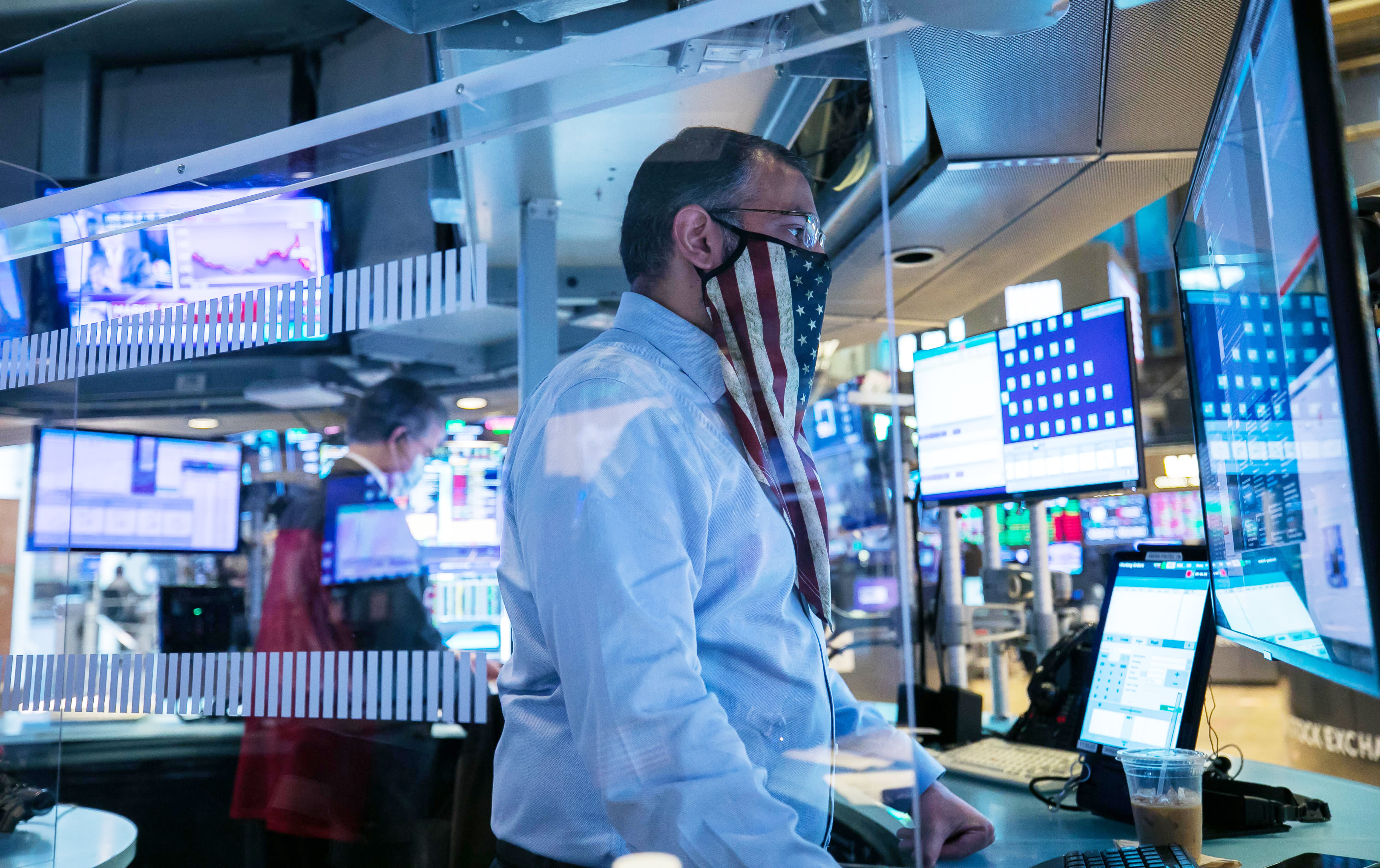
Traders work on the floor of the New York Stock Exchange on Nov. 4th. 2020.
NYSE
Markets around the world have rallied in response to news that a coronavirus vaccine from U.S. pharmaceutical giant Pfizer and German biotech firm BioNTech was 90% effective in preventing Covid-19 among those without evidence of prior infection.
The S&P 500 outpaced the Nasdaq substantially during Monday’s trade and this trend looks set to continue ahead of Tuesday’s Wall Street open. Tech stocks in Europe dropped on Tuesday while banks surged, reinforcing analysts’ belief that markets are seeing the beginnings of a rotation from growth to value stocks.
Suni Harford, president of UBS Asset Management, told CNBC on Monday that 2021 was always going to be a pivotal year amid uncertainty over the international resurgence of the virus and the prospects for fiscal stimulus stateside, but following the latest vaccine news, “this changes everything.”
“Long-term the markets had been up, some challenging how high the markets had gone with Covid still looming, but the market had adopted a two or three-year out perspective,” Harford told CNBC’s Joumanna Bercetche.
“The vaccine and this good news now, and the ability to see it actually being rolled out into 2021, I think accelerates all of that and puts 2021 in a very different light, and a more positive one.”
Value rotation
This sentiment was echoed in a note Tuesday morning from UBS Global Wealth Management Chief Investment Officer Mark Haefele, who said the market reaction thus far underlines the bank’s recent message that “investors need to diversify for the next leg, toward more cyclical parts of the market that have lagged behind in 2020, and away from big tech and the primary stay-at-home beneficiaries.”
“We have said that the next leg-up in stocks would be driven by an end to U.S. political uncertainty and sustainable mobility gains backed by a vaccine,” Haefele added.
Barclays’ Head of European Equity Strategy Emmanuel Cau said Joe Biden’s projected victory in the U.S. election and the positive vaccine readouts had materially reduced the two biggest tail risks for markets, which bodes well for reflation trade.
He suggested that Republicans’ likely retention of the Senate means a potential fiscal stimulus package may be less substantial, but a Biden administration will preserve business-friendly policy, accompanied by “less confrontational trade policy and a more accommodative (U.S. Federal Reserve) stance.”
“Positioning has turned more bullish since summer and market technicals are less favorable post the rally, but there is dry powder left,” Cau said.
“The removal of the two main sources of uncertainty could give legs to the rotation out of relative safe havens, bonds, cash and growth, into riskier assets.”
UBS’ Harford stopped short of suggesting that a reflationary trade is on the cards, and said it remained to be seen what the Biden presidency would mean for the U.S., the dollar and the rest of the world.
“And we’ll go back to looking at the markets the way they’re supposed to look, which would be slow, gradual growth around the globe, increased regulations in the United States, but slower than maybe we had anticipated depending on the Senate outcome,” she told CNBC, adding that a normalized, slower growth approach to the market would not necessarily “kill the growth trade.”
Vaccine rollout by mid-2021
The 90% efficacy finding for the vaccine produced by Pfizer and BioNTech far outstripped expectations of a 60-70% reading among analysts and compared to around a 40-60% efficacy rate for seasonal flu vaccines, according to Tara Raveendran, head of life sciences research at Shore Capital.
Raveendran highlighted that since the most recent announcement is only “headline data,” more detail is needed on several factors, including the durability of the vaccine’s protection, its long-term safety, efficacy rates among various sub-groups including the elderly and vulnerable, as well as its efficacy in preventing “mild and moderate” cases.
The Pfizer and BioNTech vaccine is an mRNA vaccine, which is typically quite unstable and needs to be transported in specialized shipping containers at temperatures below -70% centigrade, before being stored in a refrigerator for up to five days, Pfizer has explained.
Raveendran suggested that in the first instance therefore, deployment will be in higher volume centers like vaccine clinics or hospitals, with priority given to at-risk groups like frontline healthcare workers and at-risk portions of the population more likely to develop severe symptoms.
“We know that Pfizer has said they can produce enough vaccine to vaccinate 25 million people by the end of 2020 and scaling that to 1.3 billion doses, so half of that (number of vaccines would be available to people) because it’s a two-dose vaccine in 2021,” she explained.
“So we are really looking at mid-year before we can consider any sort of large scale rollout of vaccinations.”




